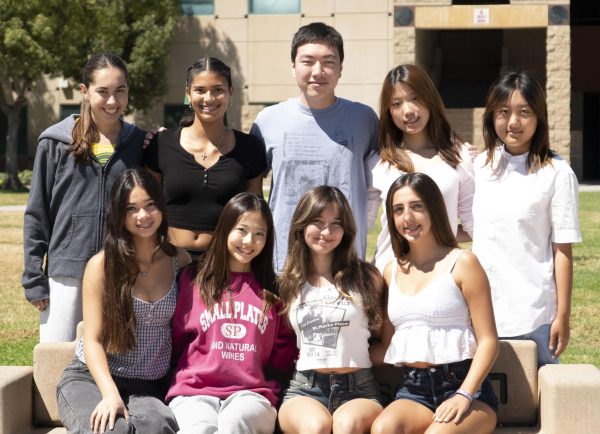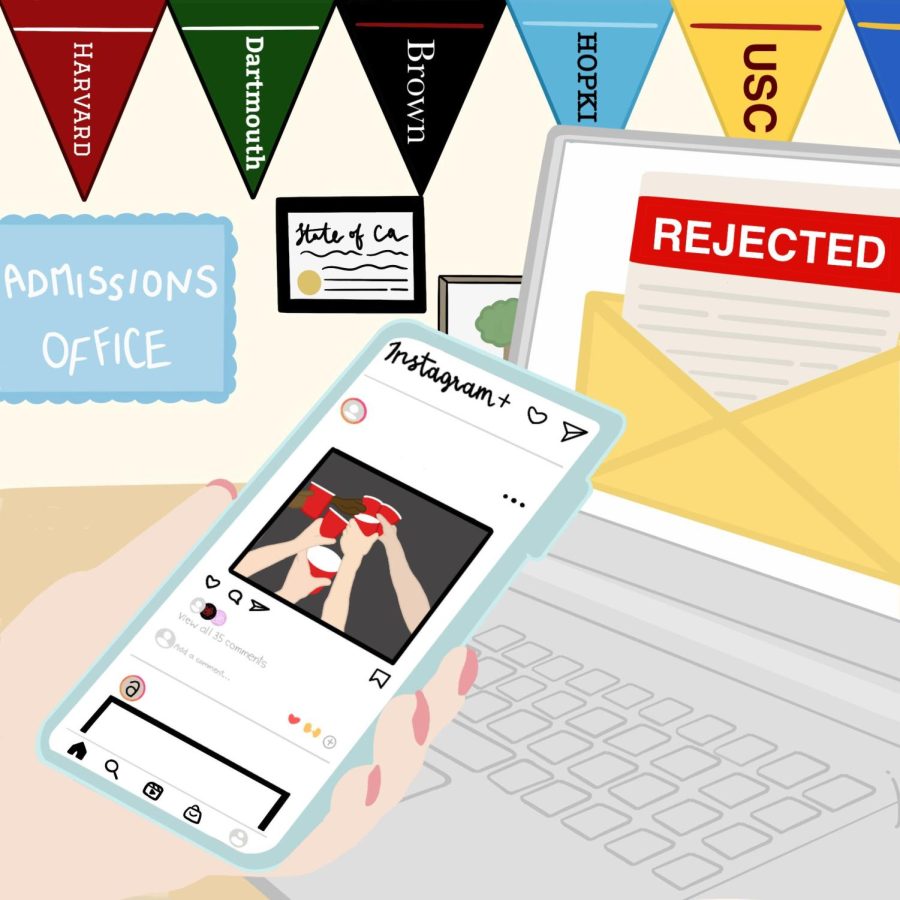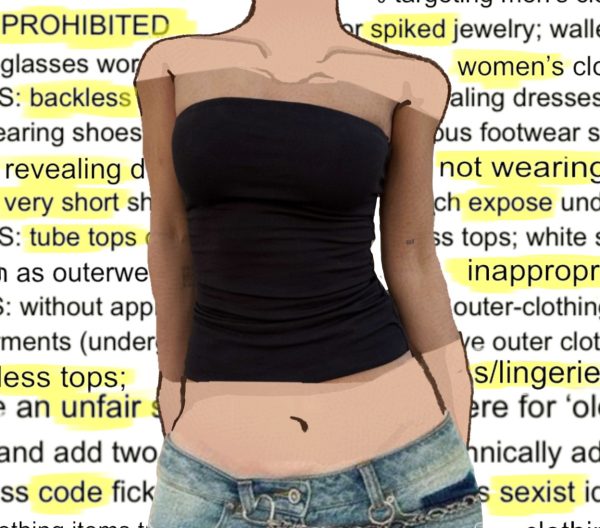Think Before You Post: Social Media Activity Impacts College Admissions
As Regular Decision notifications pop up on seniors’ phones, it is increasingly important for students to be cautious of their social media footprint.
Red Solo cups filled with beer.
Hands clasping bottles of Budweiser and Corona Extra.
Shot glasses scattered across kitchen counters.
Clouds of vape smoke.
Bring Your Own Drinks and “Alcohol is Provided” party invites.
These aren’t images of scenes from raucous college parties. Rather, these are just a few of those posts uploaded to social media by Brea Olinda High School students this school year.
As email notifications reading “Regular Action Decision” pop up on seniors’ phones, it is likely that a college admissions officer is scrolling through the prospective students’ social media accounts. Because for admissions officers, determining factors in accepting or rejecting an application are grades, extracurricular activities, writing ability, and even character (which can easily be scrutinized through a students’ social media).
The Kaplan Test Prep company surveyed 300 college admissions officers to find that more than a third “visited sites like Facebook, Instagram, Twitter, and YouTube to get more information about a prospective student.”
Is it worth risking admission to your dream school because of an Instagram Story of a raging house party or a Snap of you getting high with friends?
Nearly 75% of college admissions officers looked at applicants’ social media as part of the admissions process, so posts that show illegal, violent, racist, or provocative images may result in a rejected app. When a college admissions officer discovers that an applicant is an A student on their transcript, but an underage drinker or racist on social media, the applicant’s character and integrity are rightfully questioned.
Students may think that a negative or inappropriate post or comment from a few years ago, or one hidden under an alias, won’t get the attention of a college admissions officer, but even those most “private” social media accounts and posts leave a trail (even when “permanently deleted.”)
Social media leaves “long term footprints,” Brandi Augenstein, career counseling coordinator, said. “We know that what we put out even if we delete it, doesn’t mean it’s always deleted from the Internet. So, I always tell students, what will grandma think if she saw your post. Something grandma might not approve of… it’s not the best thing to post.”
All students who use social media leave behind a digital trail, or footprint, whether as a saved screenshot, tagged post, related search (accounts and hashtags that appear in a key word search), or suggested account (accounts with similar mutuals).
“Do not post anything your own parents would be disappointed in you posting because it can affect your college admissions,” Robert Stelmar, BOHS counselor, advised.
“We always hear stories about it, right? But, once upon a time they were admitted to ‘XYZ’ university, but their [admission] was rescinded because of something someone said on social media,” Augenstein said.
Across the country, several seniors had their college admissions rescinded due to posts that contained illegal activities, racist rants, and controversial images.
For Nikhil Fernandez, a student in San Francisco, colleges looked through his Facebook posts and asked him about them in his interview. “I was speechless when a school official asked me about all the clubbing and party pictures I posted on my Facebook account. In hindsight, I think I got rejected from that school because they might have thought I will do the same once I join school,” he said.
A senior lacrosse player had her “admission and athletic scholarship rescinded” from Marquette University after a social media post she made about the death of George Floyd “drew outrage and condemnation.”
At the University of Florida, a high school valedictorian lost her admission after posting a racist and “profanity-laced Instagram post.”
At Cornell University, a football recruit was rejected due to a Snapchat post that showed him using a racist slur.
And for ten prospective Harvard University students in 2021, their acceptances were rescinded for trading “sexually explicit memes and messages that sometimes targeted minority groups in a private Facebook group chat.”
High school students must understand the consequences of their social media posts. To avoid such consequences, some things seniors can do to positively stand out to admission committees are:
- Show your interest in schools by liking and following the colleges’ social media profiles.
- Post about hobbies and interests.
- Share highlights of your social life to reveal your personality and life outside of academics.
- Keep posting, even after you’re accepted to a college.
The reality for high school seniors is that social media use is, whether they like it or not, part of their resume, an additional tool for admissions counselors to use when scrutinizing applications. As competition for coveted spots at the country’s top colleges and universities increases (the University of California system received 210,840 first-year applications for the 2022 fall semester, a 3.5% increase over last year), BOHS seniors should want their online presence to be a highlight on their resume, not a red flag and potential cause for rejection.
Your donation supports the student journalists at Brea Olinda High School! The contribution will help us purchase equipment, upgrade technology, and cover our annual website hosting costs.

The Wildcat Editorial Board is comprised of the student journalist leadership of the Wildcat student newspaper. Membership on the board is determined by...
Senior Amber Kim is an avid reader/foodie. This is her third year on staff, and she can't wait to share about local eateries that peak her interest; alongside...








SocialTrase • Jan 9, 2024 at 8:17 am
This article is a powerful wake-up call to high school students about the significant impact of their social media activities on college admissions. The increasing trend of admissions officers scrutinizing social media profiles is a reality that cannot be ignored. It’s alarming yet unsurprising to see how posts reflecting illegal activities, racism, or other inappropriate behaviors can lead to severe consequences like rescinded admissions offers.
The advice given to students to think twice before posting and to curate an online presence that positively reflects their character is invaluable. Tools like SocialTrase could be revolutionary in this context, offering students a chance to analyze and clean up their digital footprint proactively. By using such a platform, students can ensure that their social media profiles support rather than hinder their college application process.
In addition, the suggestions for students to engage with their prospective colleges’ social media and showcase their hobbies, interests, and positive aspects of their social life are excellent. These steps can mitigate risks and actively contribute to building a strong, positive online persona that appeals to admission committees.
Overall, the article underscores an essential message for the digital age: your online presence is an extension of yourself and plays a crucial role in how you are perceived by the world, including those deciding your educational future.